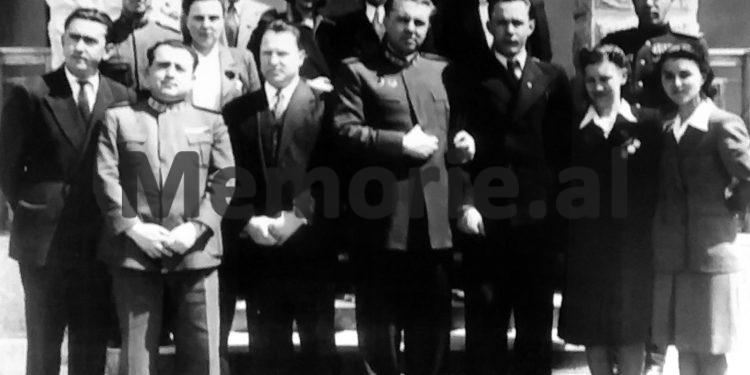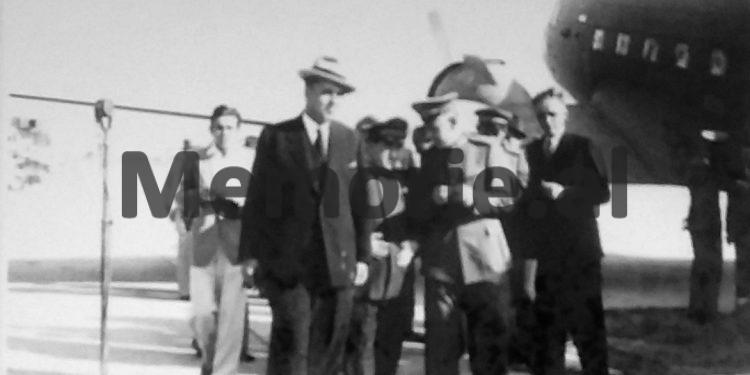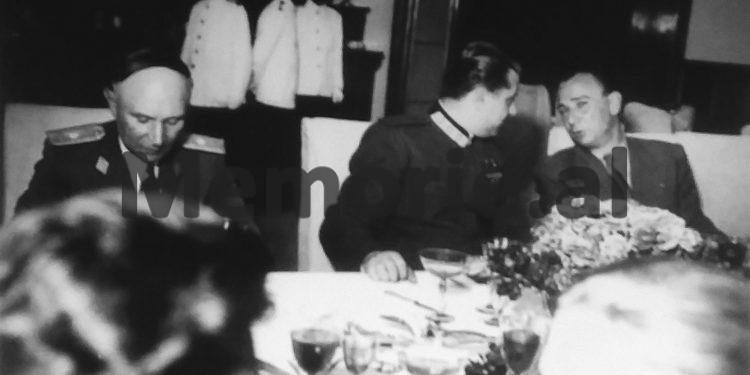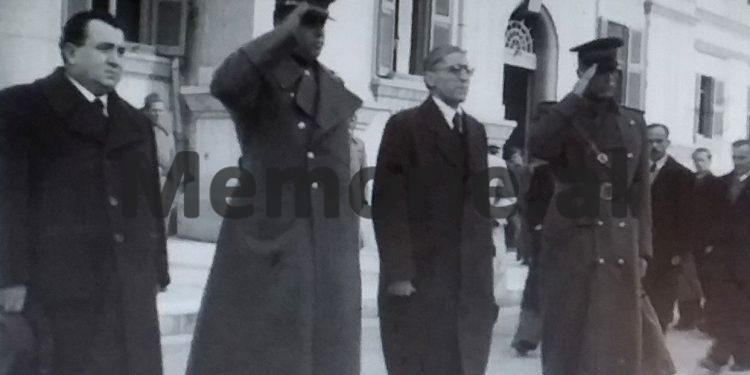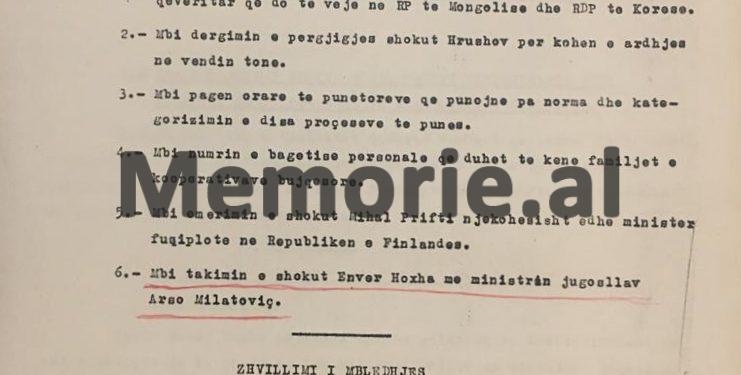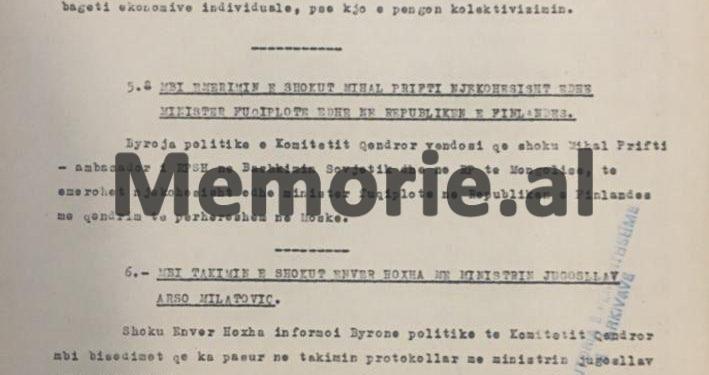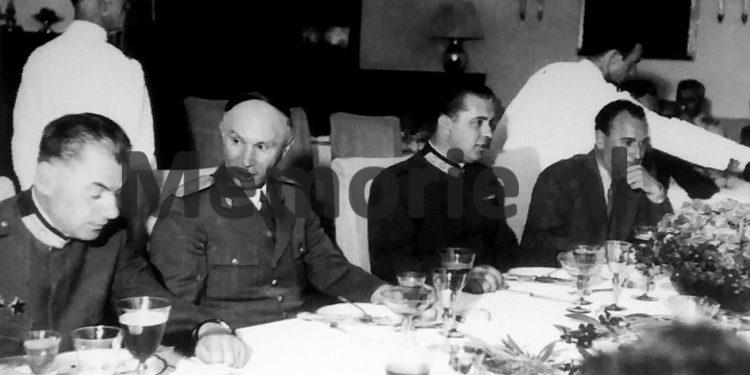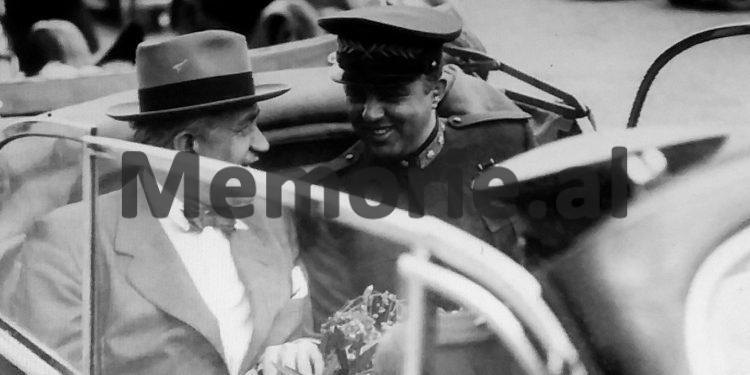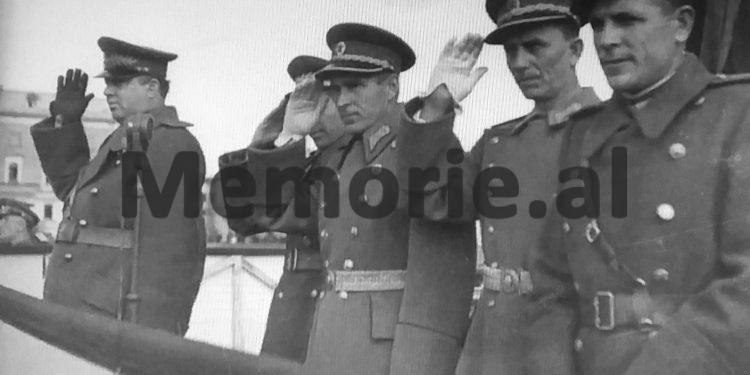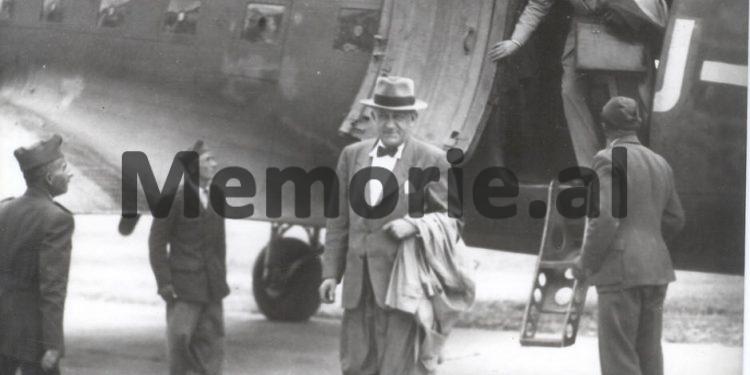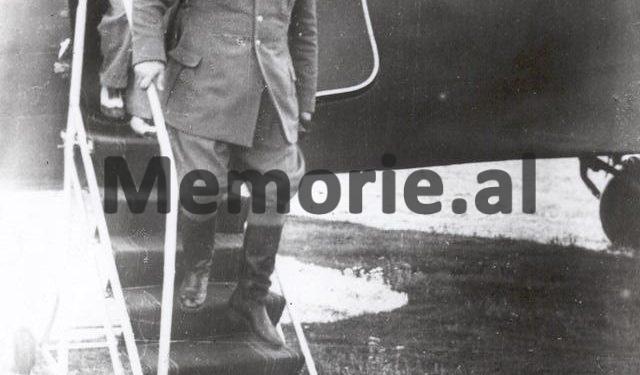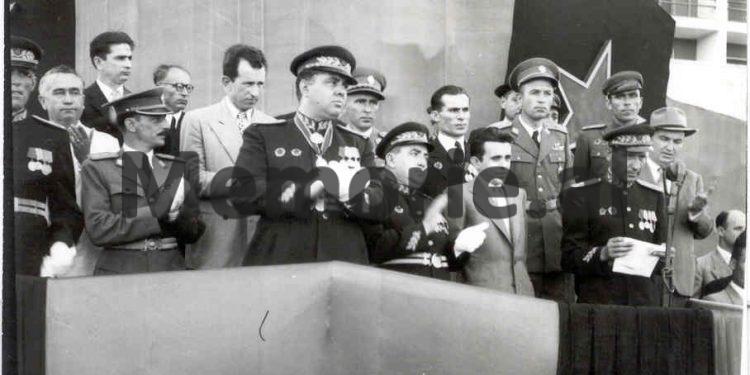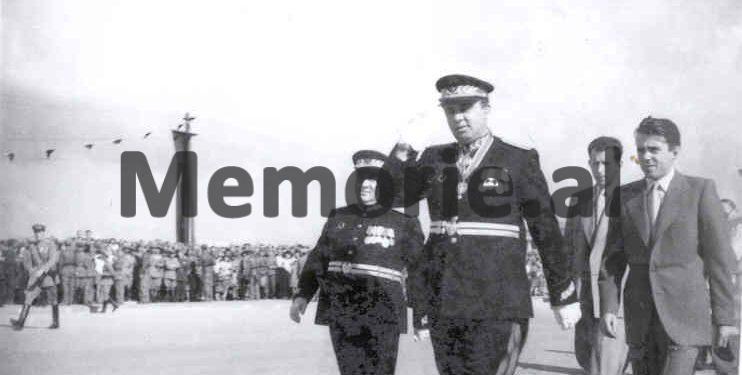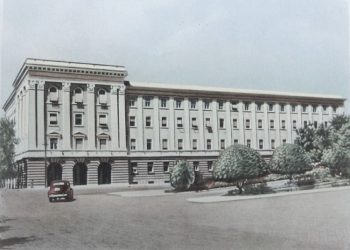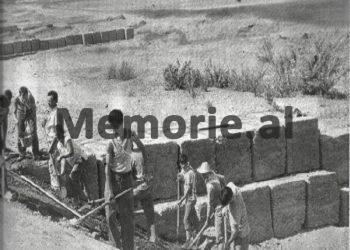Dashnor Kaloçi
Memorie.al publishes an archival document about a secret report that Enver Hoxha had held at the meeting of the Politburo on August 15, 1956, where he informed about a meeting he had with the Yugoslav ambassador to Tirana, Arso Milatovic, with which had also debated the relations that official Tirana had with Belgrade since the war when two Divisions of the Albanian National Liberation Army went and fought for the liberation of Montenegro, Kosovo, and Bosnia, and Herzegovina, the good relations they had Yugoslavia with Albania until they were broken due to Moscow’s intervention in 1949, the subsequent disagreements between them, the role of Rankovic, Koci Xoxa and Kristo Themelkos for the two Yugoslav Divisions seeking to come to Albania, letters of Naka Spiros to the senior Yugoslav leadership, where he raised accusations against Enver Hoxha, why Yugoslav They did not say what else was said in that letter and who had signed with Nako there, the accusations made by Radio Belgrade against Enver as “enemy of Yugoslavia”, the role and involvement of some diplomats of the Yugoslav legation in hostile activities against Albania, like Rexhep Xhija or Svetko Koçiç, who walked the streets of Tirana with the “enemy”, Liri Gega who had just been arrested, etc.
As early as the mid-1950s, when the newly arrived Nikita Khrushchev began the process of destabilizing the Soviet Union, initially condemning the cult of Stalin and denouncing his crimes, one of the priorities of official Moscow’s foreign policy that he followed, was also the restoration of friendly and official relations with Yugoslavia of Marshal Josif Broz Tito.
To achieve this, in 1956, Hurshov himself paid an official visit to Belgrade, where he settled all disputes between the two countries since 1948 when the top Soviet leadership through Politburo accused Tito. as sold to imperialism and publicly denounced the Yugoslavs by means of a letter distributed to all communist parties around the world.
After the flattening of its relations with Tito’s Yugoslavia, the top Soviet leadership and Nikita Khrushchev demanded the same from the senior Albanian leadership (and personally from Enver Hoxha), which since 1949, in solidarity with Informburo’s letter, had broken off all the very friendly relations he had had with Yugoslavia.
In this context of developments, after the insistence of the top Soviet leadership, during his official visit to Moscow in 1956, Enver Hoxha met and had a long conversation with Svetozar Vukmanovic Tempon, one of the leading leaders of Belgrade and close associates. of Tito. Hoxha’s meeting with the Belgrade leader was kept top secret, not only for the general public but also for the Political Bureau of the ALP Central Committee.
Regarding that meeting and some of the main issues discussed there with Vukmanovic Tempon, Albania’s top communist leadership learned only on August 15, 1956, when Enver Hoxha reported to the Politburo about a protocol meeting he had had. with the Yugoslav Ambassador to Tirana, Arso Milatovic.
Among the many issues, discussions and other debates related to the deep contradictions that had existed between the two countries since 1949, (when Albania severed relations with Yugoslavia), one of the main things that Enver Hoxha expressed to the Yugoslav diplomat at that meeting, it was his displeasure with the Yugoslav Communist Party, which did not tell him who was hiding behind Nako Spiro, in the denunciation letter the latter had made to the Yugoslavs in 1946. (Nako Spiro’s letter to the Yugoslavs, where he gives a brief biography of Enver Hoxha with highly negative considerations, calling him a mediocre man, published at the time by Vladimir Dedjer).
Enver’s dissatisfaction with Belgrade is also clearly seen in his debate with Yugoslav Ambassador Arso Milatovic, in which, among other things, he states: against the general secretary of the party. This letter, which must bear many other issues and which we do not know who signed it, has been kept secret by the Central Committee of your Foreign Party, and regularly, in Marxist-Leninist and conditional ways. of such friendly relations that existed between our two parties, the Central Committee of the Yugoslav Communist Party had to immediately denounce this letter to the Central Committee of the Albanian Communist Party. She did not do that, but even later she was used by Slavo Zlatic, who, as a representative of the Communist Party of Yugoslavia, accused Nako Spiron of being our enemy. ”
What else did Enver Hoxha talk to the Belgrade ambassador in Tirana, and what was the response of the Yugoslav diplomat regarding the problem that greatly disturbed the First Secretary of the ALP, in his efforts to preserve the Party leader and his power? personal. All this is made known in Enver Hoxha’s conversation with the Yugoslav ambassador Milatovic (which we are publishing below in this article with some abbreviations and editorial subtitles), which is detached from the full text of the entire meeting that Enver Hoxha reported it during a meeting of the Politburo on August 15, 1956.
Enver’s entire report, which includes, for the first time, his secret meeting with Svetozar Vukmanovic Tempon in 1956 in Moscow, has been classified as top secret and made public after the declassification of some of the former documents. leading bodies of the ALP by the Central State Archive in Tirana.
Document with Enver’s report to the Politburo
At the meeting of 15 August 1956, the First Secretary of the Central Committee of the P.P.SH. Comrade Enver Hoxha informed the Political Bureau of the Central Committee of the Party about the communication made by the Ambassador Extraordinary and Plenipotentiary of the Soviet Union to Albania, Comrade L.I. Kirillov. When Comrade Mikoyan, a member of the Presidium of the Central Committee of the Communist Party of the Soviet Union, was on the island of Brioni in Yugoslavia, among others, the President of Yugoslavia, Joseph Broz Tito, told him that:
“Relations with Albania are not improving because Albanians do not approach their friendly proposals and that Comrade Mehmet Shehu hinders the realization of these relations, while on his part Comrade Enver Hoxha does not receive the Yugoslav Minister at the meeting.” Comrade Mikoyan, as always, defended our case by saying, among other things, to Comrade Tito: that it is not true that Albanians do not want good relations with Yugoslavia; they are for these relations and work in this direction, only that your people in Tirana, intervene in the internal affairs of Albania in an agency way, etc.
Rankoviçi replied to Comrade Mikoyan that: we have given a firm order to stop the agency activity in Albania and that we cannot but be interested in the “heroes” of the national liberation war, etc. Tito interrupted Rankovic, telling him that we should not interfere in Albania’s internal affairs. Kardeli also told Mikoyan that: Enver Hoxha is crying through you. In the end, Comrade Mikoyan told the Yugoslavs that in his opinion, low-level talks did not work, so the possibility of high-level talks should be considered, and cited the meeting of Comrade Enver with Comrade Tempo in Moscow, where they not only talked well but also hugged.
Tito with a smile told Mikoyan that: Tempo has regretted doing it. Mikoyan replied with a laugh that; you may be putting pressure on Tempon, so he has become remorseful. Mikoyan added that your stance can be taken as a chauvinist stance by Albania, that you should keep in mind that Albania is a sovereign, independent country and it also has the prestige of its amorphous and that the Albanian Labor Party as a Marxist-Leninist party has worked and works well. You have in mind – said Mikoyan – the mistakes of the Federation of the Russian Socialist Republic and the great Russian disease against other republics. This was the communication that the ambassador of the Soviet Union made to Comrade Enver.
Milatovic: Enver, apologize
Comrade Enver Hoxha had an extraordinary meeting with the Ambassador Extraordinary and Plenipotentiary of the People’s Federal Republic of Yugoslavia, Arso Milatovic, on August 4, 1956. Among other things, the Yugoslav Minister raised these issues, emphasizing that he speaks on behalf of the leadership. of the party and the Yugoslav government: “When you delivered your speech at the Third Congress of the Party, our leading comrades, when they read the section on relations with Yugoslavia, were astonished, as they were not entitled to speak there. It states that during the period 1945-1948, Yugoslavia made fundamental mistakes towards Albania and that Yugoslavia is to blame, but this is not the case.
During this period we have had good relations and by fighting together, against the same enemy, both our countries have gone through a specific path and without any other example, they were liberated and built the popular power. After the liberation, our relations deepened even more in a normal way in terms of economic, cultural relations, etc. Every Yugoslav is happy to read Comrade Enver’s speeches before the period of the breakdown of relations. Then these relations were broken for the mistakes of Stalin who intervened in the internal affairs of Yugoslavia, etc.
So, looking at these issues in this light and trying to develop good relations between our countries, to exchange parliamentary delegations, to develop trade, to exchange cultural delegations, etc. The Central Committee of the League of Communists of Yugoslavia thinks that the Central Committee of the Albanian Labor Party should issue a statement recognizing that Yugoslavia has no mistakes towards Albania in the period 1945-1948, that everything that has been said about Yugoslavia in Various trials must be held, because we are not interested in Albanian people who have been convicted, etc.
Enver: Who is hiding behind Nako Spiro
Comrade Enver continued: “But the fact is that we, the Albanian communists, have sincerely loved the Yugoslav people, your party and comrade Tito, and my speeches have confirmed this thesis. It is true that our relationship was broken by the betrayal of Agent Beria, but your mistakes in 1944-1948 cannot be erased. Let me just say a few: In 1944, a Yugoslav Army officer, Velimir Stojnic, who was later appointed Yugoslav Ambassador, intervened impermissibly in the affairs of our Party. This is confirmed by the protocols of the Central Committee of our Party.
You have published material against us, part of a letter from Nako Spiro, where the latter speaks against the general secretary of the Party. This letter, which must bear many other issues and which we do not know who signed it, has been kept secret by the Central Committee of your Foreign Party, and regularly, in Marxist-Leninist and conditional ways. of such friendly relations that existed between our two parties, the Central Committee of the Yugoslav Communist Party had to immediately denounce this letter to the Central Committee of the Albanian Communist Party.
She did not do that, but even later she was used by Slavo Zlatic, who, as a representative of the Communist Party of Yugoslavia, accused Nako Spiro before our leadership as an enemy. Koci Xoxa’s crimes against the Party and our state started from Berat. What is all this, comrade Minister of Yugoslavia Arso Milatovic? – Comrade Enver asked. Why did you do that? He replied that: our comrades have made tactical mistakes and we have taken action.
Comrade Enver told him that: you may have taken measures and we are not interested in that, but we are interested in the issue of the Party line, not that it has pursued against our Party, and we call these your mistakes. We know that Comrade Tito acknowledged that the request to send the Yugoslav Division to Albania was a mistake on the part of Yugoslavia.
The Yugoslav Minister said that the sending of this Division was requested by Kristo Themelko in Belgrade, that the situation in Albania was allegedly serious, etc. Comrade Enver replied that we know his mistakes, but we have a telegram from Rankovic, who asked Koci Xoxa to send the Division to Albania. But that was not the only issue of a Division to send to Albania – Comrade Enver continued – but there were many Divisions.
Enver: Am I not the enemy of Yugoslavia?
Comrade Enver finally told him that these issues that I told them are the main ones and these were mistakes on your part. But there are a few small things I don’t want to mention. But our Party and Congress want all this to be closed, to put a cross on you because they do not serve to improve relations with Yugoslavia because if we open these, we will scream in the thorns.
However, if the Yugoslav leadership wants to discuss these, we are ready, we will not lose. For this reason, I said – continued Comrade Enver – that what has been said in the Congress of our Party is not only right and Marxist-Leninist but also very wise. The Yugoslav Minister stated that: this conversation was very interesting and clarifying, that his mission was to improve relations with our country.
Comrade Enver told the Yugoslav Minister that the editors of Radio Belgrade have been accusing our Party and now personally of me as a permanent enemy of Yugoslavia. The editor of Radio Belgrade and all those who work like him should know that the order given by our Party to the Divisions of the National Liberation Army, to liberate Montenegro, Kosovo, Bosnia, and Herzegovina, I have signed, and if I was the enemy of the peoples of Yugoslavia, I would not do it.
And everyone should know that our Party and its leadership have loved and still love the Yugoslav people, not for the hatred of anyone on Radio Belgrade, but because that is how our Party teaches us and the interests of our Party. The Yugoslav Minister replied that Radio Belgrade had made a big mistake in this matter and that Yugoslavia had greatly appreciated the help of the Albanian people and its Party, and therefore the only man who had been decorated outside Yugoslavia by order of the People’s Hero. of Yugoslavia, you are Comrade Enver.
Enver: Your diplomat, walk with Liri Gega
Comrade Enver also told the Yugoslav minister not to go any further, but recently the Yugoslav satirical newspaper “Jexh” at the time when Marshal Tito received the Albanian minister in Belgrade, she drew a vile cartoon against our leadership. The newspaper “Jexh” and all those who think like “Jexhi” – said Comrade Enver – are seriously mistaken, they should know that the unity in the Party and our leadership is steel and there is no force in the world to endanger it.
Our leadership, from top to bottom, is about relations with Yugoslavia on the Marxist-Leninist path and not on any other path. The Yugoslav Minister replied that the satirical newspaper “Jexh” had made a big mistake, that he had seen this and had protested vigorously at the Yugoslav Ministry of Foreign Affairs.
Comrade Enver told him that we also know how to write, but you will be very strong if you find a word against Yugoslavia during this time that our relations have improved. Comrade Enver begged the Yugoslav Minister, in his report, to be objective, because we understand the very important role of the representative of a state in improving relations.
The Yugoslav Minister assured Comrade Enver that he would be objective, that his aim was to improve relations between the two countries.
Comrade Enver replied that he had confidence in his statements and wished that all the staff of the Yugoslav Legation would work in this direction, that many of the personnel of the Yugoslav Legation did not act in this spirit. But hostile to the country and our Party.
The Yugoslav minister asked Comrade Enver to tell him what he had to do with these people.
Comrade Enver told him that he had a lot of things to do with Rexhep Xhija and others, but he would only mention one fact, for the first secretary of the Yugoslav legate, Svetko Koçiçi, who walks the streets of Tirana side by side with the enemy of the Party. Liri Gega, who was recently arrested.
In the end, the Yugoslav Minister assured Comrade Enver Hoxha, telling him that he was satisfied with the open conversation and hoped that this would facilitate the improvement of relations between our two countries.
First Secretary of the Central Committee of the Albanian Labor Party
Enver Hoxha
Precedent: “Enver dictated the report on the Bureau to the stenographer himself”
One of the most unusual things that stand out in the archival document extracted from the fund of the governing bodies of the ALP, is a short note with only one line at the end of the minutes of the meeting of the Politburo dated 15.8.1956, where it is stated: “(The protocol on this issue was dictated by Comrade Enver himself and bears No. 26 / A, dated 15.8.1956).
This note was given after point 6. of the meeting of the Bureau, where it is stated: “On the meeting of Comrade Enver Hoxha with the Minister of Yugoslavia, Arso Milatovic”. Following this point, it reads: “Comrade Enver Hoxha informed the Political Bureau of the Central Committee on the talks he had in the protocol meeting with the Yugoslav Minister, Arso Milatovic. In the end, it was decided that a protocol of the Political Bureau would be issued on this issue, which would be sent for notification to the First Secretaries of the party committees of the districts and counties, and the main cadres of the party and the state would be informed.
So, as seen above in these notes taken from the archival document for the meeting of the Political Bureau of the Central Committee of the ALP, the protocol meeting of Enver Hoxha with the Yugoslav Ambassador to Tirana, Arso Milatovic, was not presented to the Political Bureau according to the process. verbally held during that meeting, but the report that was read in the Bureau was made by what Enver Hoxha himself dictated to the stenographer.
Likewise, the material that was then distributed to the party and district committees is not the original protocol drawn from Enver’s meeting with Ambassador Milatovic, but another report elaborated by the Bureau.
All of this casts a shadow of doubt and makes you believe or suspect that: Enver, another thing he talked to the Yugoslav diplomat, and another thing he reported to the Politburo. This should be seen in the context of that period when Enver Hoxha initially agreed with the new political line that Khrushchev was pursuing in the context of the destabilization of the Soviet Union and other Eastern European countries, but when he saw that his power was seriously endangered. his personal, he immediately returned the course, taking the war flag in defense of Stalin. Memorie.al




